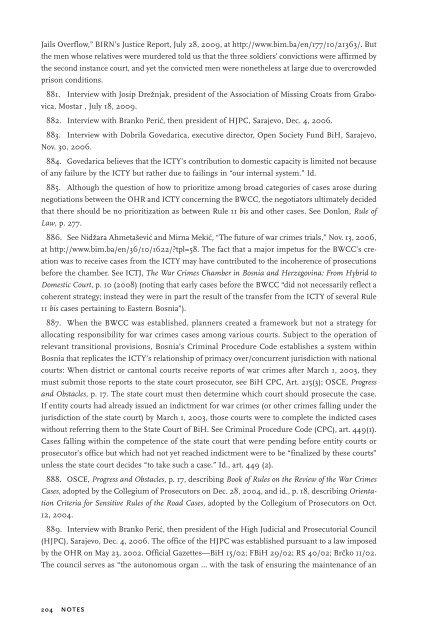That Someone Guilty Be Punished - International Center for ...
That Someone Guilty Be Punished - International Center for ...
That Someone Guilty Be Punished - International Center for ...
Create successful ePaper yourself
Turn your PDF publications into a flip-book with our unique Google optimized e-Paper software.
Jails Overflow,” BIRN’s Justice Report, July 28, 2009, at http://www.bim.ba/en/177/10/21363/. But<br />
the men whose relatives were murdered told us that the three soldiers’ convictions were affirmed by<br />
the second instance court, and yet the convicted men were nonetheless at large due to overcrowded<br />
prison conditions.<br />
881. Interview with Josip Drežnjak, president of the Association of Missing Croats from Grabovica,<br />
Mostar , July 18, 2009.<br />
882. Interview with Branko Perić, then president of HJPC, Sarajevo, Dec. 4, 2006.<br />
883. Interview with Dobrila Govedarica, executive director, Open Society Fund BiH, Sarajevo,<br />
Nov. 30, 2006.<br />
884. Govedarica believes that the ICTY’s contribution to domestic capacity is limited not because<br />
of any failure by the ICTY but rather due to failings in “our internal system.” Id.<br />
885. Although the question of how to prioritize among broad categories of cases arose during<br />
negotiations between the OHR and ICTY concerning the BWCC, the negotiators ultimately decided<br />
that there should be no prioritization as between Rule 11 bis and other cases. See Donlon, Rule of<br />
Law, p. 277.<br />
886. See Nidžara Ahmetašević and Mirna Mekić, “The future of war crimes trials,” Nov. 13, 2006,<br />
at http://www.bim.ba/en/36/10/1622/?tpl=58. The fact that a major impetus <strong>for</strong> the BWCC’s creation<br />
was to receive cases from the ICTY may have contributed to the incoherence of prosecutions<br />
be<strong>for</strong>e the chamber. See ICTJ, The War Crimes Chamber in Bosnia and Herzegovina: From Hybrid to<br />
Domestic Court, p. 10 (2008) (noting that early cases be<strong>for</strong>e the BWCC “did not necessarily reflect a<br />
coherent strategy; instead they were in part the result of the transfer from the ICTY of several Rule<br />
11 bis cases pertaining to Eastern Bosnia”).<br />
887. When the BWCC was established, planners created a framework but not a strategy <strong>for</strong><br />
allocating responsibility <strong>for</strong> war crimes cases among various courts. Subject to the operation of<br />
relevant transitional provisions, Bosnia’s Criminal Procedure Code establishes a system within<br />
Bosnia that replicates the ICTY’s relationship of primacy over/concurrent jurisdiction with national<br />
courts: When district or cantonal courts receive reports of war crimes after March 1, 2003, they<br />
must submit those reports to the state court prosecutor, see BiH CPC, Art. 215(3); OSCE, Progress<br />
and Obstacles, p. 17. The state court must then determine which court should prosecute the case.<br />
If entity courts had already issued an indictment <strong>for</strong> war crimes (or other crimes falling under the<br />
jurisdiction of the state court) by March 1, 2003, those courts were to complete the indicted cases<br />
without referring them to the State Court of BiH. See Criminal Procedure Code (CPC), art. 449(1).<br />
Cases falling within the competence of the state court that were pending be<strong>for</strong>e entity courts or<br />
prosecutor’s office but which had not yet reached indictment were to be “finalized by these courts”<br />
unless the state court decides “to take such a case.” Id., art. 449 (2).<br />
888. OSCE, Progress and Obstacles, p. 17, describing Book of Rules on the Review of the War Crimes<br />
Cases, adopted by the Collegium of Prosecutors on Dec. 28, 2004, and id., p. 18, describing Orientation<br />
Criteria <strong>for</strong> Sensitive Rules of the Road Cases, adopted by the Collegium of Prosecutors on Oct.<br />
12, 2004.<br />
889. Interview with Branko Perić, then president of the High Judicial and Prosecutorial Council<br />
(HJPC), Sarajevo, Dec. 4, 2006. The office of the HJPC was established pursuant to a law imposed<br />
by the OHR on May 23, 2002. Official Gazettes—BiH 15/02; FBiH 29/02; RS 40/02; Brčko 11/02.<br />
The council serves as “the autonomous organ … with the task of ensuring the maintenance of an<br />
204 NOTES

















